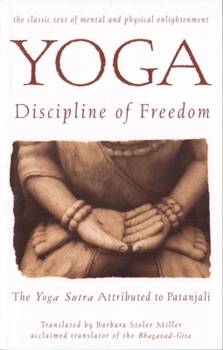Yoga: Discipline of Freedom: The Yoga Sutra Attributed to Patanjali
Select Format
Select Condition 
Book Overview
Dating from about the third century A.D., the Yoga Sutra distills the essence of the physical and spiritual discipline of yoga into fewer than two hundred brief aphorisms. It is the core text for any... This description may be from another edition of this product.
Format:Paperback
Language:English
ISBN:0553374281
ISBN13:9780553374285
Release Date:March 1998
Publisher:Bantam
Length:128 Pages
Weight:0.30 lbs.
Dimensions:0.4" x 5.3" x 8.3"
Customer Reviews
5 ratings
The Yoga Sutra Attributed to Patanjali
Published by Thriftbooks.com User , 14 years ago
The book arrived in the stated time period and is what I expected; I'm well satisfied with the service.
Worthy of reading.
Published by Thriftbooks.com User , 16 years ago
The yoga sutras are a good beginning. Patanjali was a dualist, if you have monist tendencies, try the Shiva Sutras. This translation is good.
Excellent for a first reading
Published by Thriftbooks.com User , 20 years ago
The main strength of this book is in the late Professor Miller's Introduction which is lucid and insightful in identifying and placing Patanjali's Yoga Sutras for the general reader. The weakness is in Miller's use of certain non-yogic and sometimes misleading terms in her translation, usage which stems from her position as an academic of yoga and not a practitioner. Sometimes she translates words that probably should not be translated since there are no real English equivalents--for example, "samadhi" itself. And sometimes she uses what I would consider not the most agreeable English equivalent.Her use of the word "spirit" in the third aphorism is an example: "When thought ceases, the spirit stands in its true identity as observer to the world." The Sanskrit word she is translating is "drashtri" which is usually "seer" although it can also mean "soul," according to B.K.S. Iyengar. When one reads the next aphorism, "Otherwise, the observer [seer] identifies with the turnings of thought" it becomes clear that the seer is not spirit; indeed "spirit" is a confusing word in this context since it has no clear cognate in the dualistic yoga philosophy. The closest equivalent would be "purusha" but that would be inappropriate since that refers to the entire non-material consciousness (as opposed to "prakriti," which is what is manifested). Perhaps I should simply say that "soul" in yogic philosophy is not the same thing as "spirit."Another example would be her translation of vairagya in I.15 as "dispassion" which is technically correct but misses the larger meaning of the non-attachment that comes from renunciation, which is the point of the aphorism. I could also quibble with her use of the word "contemplation" as the equivalent of the Sanskrit "samadhi." But it is really impossible to translate the last three limbs of yoga: dharana, dhyana, and samadhi into English, and the contemporary practice is to simply use the Sanskrit terms themselves. And, at any rate, there is considerable controversy about the experience of these states. Miller follows the established practice of rendering them respectively as concentration, meditation, and contemplation. Yet it is clear that samadhi, especially "nirbija samadhi" or seedless samadhi, is beyond contemplation. Georg Feuerstein actually defines samadhi as "ecstasy."Another strength of the book is the translation itself--once one puts aside the quibbles about some of the terms and looks at the forest, as it were, of the entire expression. Miller has worked hard to make the text readily accessible to the general reader by using familiar terms in familiar sentence structures. She also groups several related aphorisms together and comments on them as a whole, giving each group a title. For example, aphorisms I.17 - I.22 are labeled, "Ways of Stopping Thought." This organization works well in helping the reader to a good overall understanding of Patanjali with only a first reading. Miller has not s
How Can Someone Know God?
Published by Thriftbooks.com User , 22 years ago
This is a very condensed translation of the fundamental theological handbook for those who want to devote themselves to the austerities of the study of the details of the metaphysics of meditation on God (which transcend any particular religion). From the precision of the translation I can see that Dr. Barbara Miller had been studying this work for long time before she wrote this book. She has left out the details of the tranlations of the Sanskrit words. Of course, she would have had to a assume a fundmental knowledge of the Sanskrit language and its alphabet for this(Mr. Houston at the American Sanskrit Institute has published some very useful tapes and workbooks for this). Also, she leaves out translations of most of the very enlightening comments of the Hindu sage Vyasa (these are available in English in the book by Swami Hariharananda and also the book which she references in the Harvard Oriental series by Dr. Houghton Woods). Nevertheless, by giving us a concise translation of these important scriptures which are faithful to the original Sanskrit she has done good. Thank you Dr. Miller for your scholarly work in this area.
Timeless wisdom made available to the modern reader
Published by Thriftbooks.com User , 24 years ago
The *Yoga Sutras* is an ancient Indian text attributed to the sage Patanjali. They discuss "yoga" in the deep spiritual sense-- not the physical exercises of Hatha Yoga, but the essential techniques of stilling the mind and achieving spiritual illumination. The objective, almost scientific, treatment of *Yoga Sutras* presents the reader with an anatomy of consciousness itself, as well as an atlas of the highest human possibilities. Prof. Miller's translations make this esoteric text readily available to the modern reader. Her translation is lucid and easy to read, without sacrificing any of the wisdom or precision of the text itself. I would recommend this book to any one who takes seriously the idea of spiritual work and the goal of spiritual transformation.





